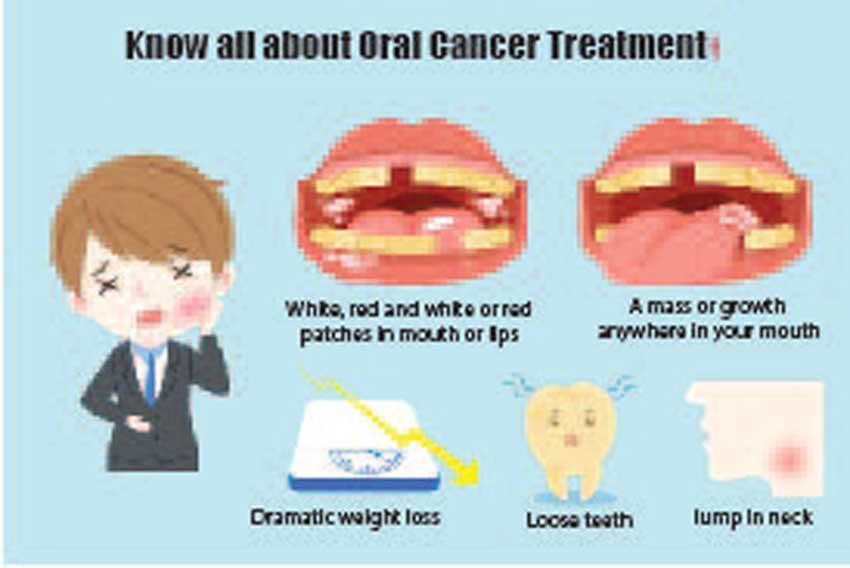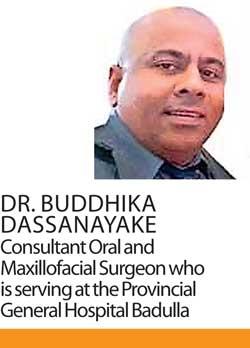Reply To:
Name - Reply Comment

 Cancer is a big challenge that is faced by mankind globally. If we take Sri Lanka the two most common cancers are oral and breast cancer.
Cancer is a big challenge that is faced by mankind globally. If we take Sri Lanka the two most common cancers are oral and breast cancer.
Out of those two cancers oral cancer is the most common cancer among Sri Lankan males. Every day three or four people die due to this deadly disease. Annually about three thousand new cases are reported. Along with its fatality, it is highly debilitating, disfiguring, and people who are fortunate enough to survive live a miserable life.
Today we bring you valuable information on this topic in consultation with Dr. Buddhika Dassanayake, a Consultant Oral and Maxillofacial Surgeon who is serving at the Provincial General Hospital Badulla.
As we all know, our faces and mouths are the gateway to many important functions and aesthetics. The structures there help us in eating, talking, breathing, expressing our feelings and maintain good looks. But this menacing disease will destroy them all and even bring death.

According to scientific evidence the main causative factors are betel chewing, smoking, alcohol and certain viruses. It is also known that heredity also plays a minor role. In our country the leading cause is undoubtedly ‘betel chewing’.
It is scientifically proven that all four ingredients including the betel leaf, tobacco, arecanut, and lime are contributory for the causation of oral cancer. Apart from that, there are products coming from abroad (specially south Indian sub-continent) such as “Babul, Mawa” etc., which are many times more dangerous and highly carcinogenic, and unfortunately have a big impact on members of the younger generation. Alcohol and smoking have synergistic action and they help each other in causing oral cancer especially in the tongue and the floor of the mouth.
Identifying early lesions is a very important aspect in managing oral cancer. If the disease can be identified at the inception the five-year survival rate is about eighty percent. In other words, if we take hundred patients with early disease symptoms and treat them, about eighty of them will be able to live for the next five years. The terrifying fact is that in advanced disease condition, the five-year survival rate is less than twenty percent. Which means out of hundred patients less than twenty will be able to live for the next five years even if they receive treatment.
This mere fact emphasises the importance of identifying the disease at an early stage within the community.
It is very important to learn how to do a “self-mouth examination” properly. If one has any of the above conditions or any other suspicious oral lesions it is very important to meet your Dental surgeon or medical doctor and get the necessary referral done for specialist care.
The mainstay of treatment for oral cancer is surgery. Radiotherapy and Chemotherapy are the two other treatment modalities in the management of oral cancer.
Although, Oral Cancer is the number one cancer among Sri Lankan males, with very high mortality and morbidity, it is pathetic to say that not much attention is geared towards the management of this preventable disease. One can doubt that, because it is a “poor man’s disease” since those who are affected from oral cancers are farmers, manual workers, daily wage earners and other economically deprived segments of our society. But it is very important to note that, they are the bread winners of this country, who produce food, and they deserve necessary attention.
Educating the community about the hazardous habits, picking up patients with early lesions and directing them for treatment will greatly improve the oral cancer prevention and management.
Although Oral and Maxillofacial Surgeons, Onco Surgeons and Oncologists are working hard throughout the country and do an immense service in far corners of the island to cure patients, the specialists who are responsible for preventing the oral cancer at the community level are mainly confined to Colombo; failing to carry out effective mode of community programmes in remote areas. This is reflected in the continuously increasing number of patients visiting hospitals with advanced oral cancers.
The service of the Dental Surgeons, who carry the expertise in identifying early lesions of oral cancer at the community level, are also not utilised properly.
In conclusion, Oral cancer is a deadly disease, which causes dramatic damage to the society, economy and to the country as a whole, but it has not been addressed properly. Therefore, it is the duty of us as the healthcare providers to save our fellow citizens from this preventable disease.